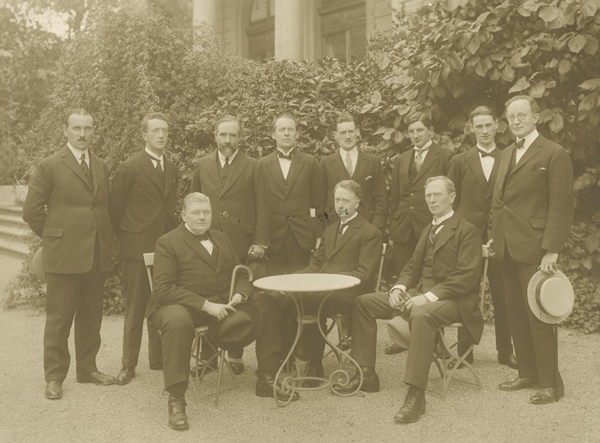Ireland accepted into League of Nations at Geneva ceremony
Geneva, 11 September 1923 - ‘Our freedom is recognised by the nations of the world’, President William T. Cosgrave told a press representative following Ireland’s acceptance into the League of Nations in Geneva yesterday.
A report of the Sixth Commission of the League of Nations which recommended Ireland’s admission was approved unanimously by the representatives of forty-six nations. Delegates of each nation were called in alphabetical order to give their approval to which each and every one responded with a ‘Yes’, leaving it to the President, Cosme de la Torriente y Peraza of Cuba to proclaim Ireland elected.
There followed a storm of applause after which the President of the League invited the Irish delegates - President Cosgrave, Prof. Eoin MacNeill and Mr. Desmond Fitzgerald - to take their places, the Irish table being placed between that of Haiti, New Zealand and Norway.
When invited to address the Assembly, President Cosgrave spoke first in Irish, announcing that the delegates of Saorstát Éireann, from its Parliament and Government, had come to participate in the great work of the League. When turning to English, President Cosgrave spoke at greater length. He began, pointedly, by stating that it was ‘On behalf of Ireland, one of the oldest and yet one of the youngest nations’ that he - Cosgrave -thanked the Assembly for the unanimous acceptance of Ireland’s application and that she now ‘entered into a new bond of union with her sister nations, great and small, who are represented in this magnificent world gathering.’
In emphasising Ireland’s pacific ambitions, President asserted that it was Ireland’s ‘earnest desire’ to co-operate with fellow members in efforts to ‘avert the ancient evils of warfare and oppression; to encourage wholesome and to discourage unwholesome relations between nation and nation; to enable even the weakest of nations to live their own lives and make their own proper contribution to the good of all, free even from the shadow and the fear of external violence, vicious penetration, or injurious pressure of any kind.’
President Cosgrave added that he hoped the League of Nations would assist Ireland’s economic and educational progress and that as he and his fellow Irish delegates returned home ‘To take part with our own patriotic people in the enormous work of national construction and consolidation’, they would do so sustained by the ‘kind welcome’ and the ‘cordial words of understanding’ they had received from their fellow members of the League of Nations.
Following his speech, the Irish table in the Assembly hall was surrounded by well-wishing delegates from nations across Europe, the British empire, the Orient, but perhaps most enthusiastically by the Latin and American delegates. Last night, while still in Geneva, President Cosgrave told a special representative of the Irish Independent newspaper that ‘our status is defined, we now begin to receive the universal consideration to which we are entitled by the position we have won.’
[Editor's note: This is an article from Century Ireland, a fortnightly online newspaper, written from the perspective of a journalist 100 years ago, based on news reports of the time.]





















